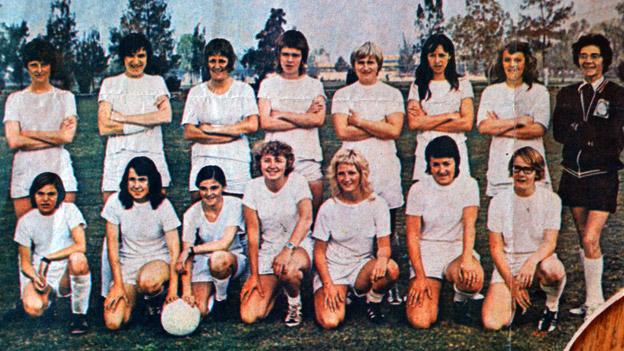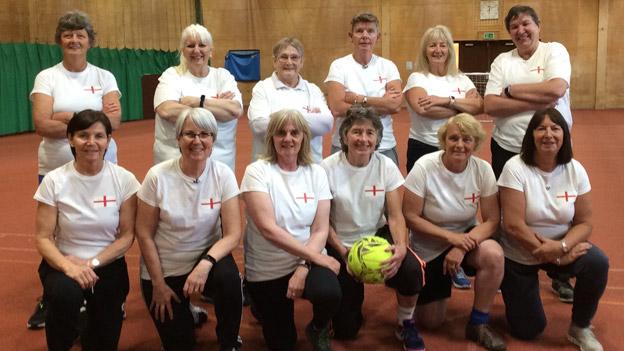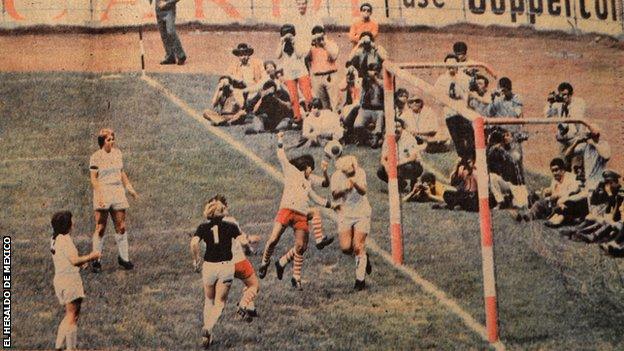Women's World Cup: 1971 'lost lionesses' squad tracked down after 48 years
- Published


The squad in 1971 and 2019
Almost half a century after playing in front of 90,000 fans at the Azteca Stadium in Mexico City at an early Women's World Cup, the 1971 unofficial England team are back together.
It is still the record crowd for an English women's team, but they were banned on their return and lost touch.
Now, the 14-strong squad are back in contact after a search by the BBC.
"It was the last thing on my mind that somebody would be looking to find me," said right winger Paula Milnes, 63.
After some players started searching for their long lost team-mates, more were traced during the research for a recent BBC Sport article telling their story.
Just two were left to find - and they were eventually located by BBC One's The One Show, which broadcast a reunion of 12 of the former players on Wednesday. (Two squad members were unable to be at that get-together in person.)
Paula Milnes, formerly Paula Rayner, was 15 when she played in Mexico, scoring for England against Argentina at the Azteca. "After 48 years we all just gelled together again, like we hadn't really been out of touch," she said.
"Everybody was just so friendly and pleased to see you. It was fantastic."
After Mexico, she became an HGV driver for the RAF and is now a high school finance officer in Merseyside.

England playing Mexico in the Azteca Stadium in 1971
Jean Elliott, née Breckon, 69, from Skipton, North Yorkshire, was other last "missing" player. She and Mrs Milnes were surprise guests at The One Show's reunion.
"My heart stopped a few times when I went round the corner to meet them all," Mrs Elliott said. "They all ran up to me hugging, and I'm not a huggy person!
"But I enjoyed it and it brought a few tears to my eyes, and it was nice to see them all."
Chris Lockwood, 63, from Bedfordshire, was among a trio of former players who kicked off the search around a year ago. She said she was "over the moon" that they had tracked everybody down.
"To get all 14 of us is beyond our dreams really," she said. "Every time we speak to each other, we're just like we were all those years ago, there's nothing changed.
"We haven't met any one of them and thought, well, she seems a stranger. It's not been like that. And it's fantastic that we're all fairly fit and well."
'You paved the way'
At the reunion, the players were shown a video message from midfielder Jill Scott, who has played more World Cup games than any other England player and is currently at this year's tournament.
"You really have paved the way for us," Scott told them. "Without you, we wouldn't be here today having the career that we absolutely love... Hopefully we can do you proud out here in France."
Chris Lockwood said the players were "very proud" to have got her message. "It meant a lot to the girls," she said.
"At the time, we didn't know that we were paving the way for the players of today, we just did it for the love of the sport. But we're very glad that we did do it."
At the time of the 1971 tournament, a 50-year FA ban on women's football had only just been lifted and female footballers in England mainly played on local park pitches.
But when they touched down in Mexico, the team were treated like superstars, with tens of thousands watching their games, fans camping outside their hotel and newspapers reporting on their experiences on and off the field.
They went out at the group stage, and on their return home were banned for three months by the WFA, which was in the process of establishing an official England team.